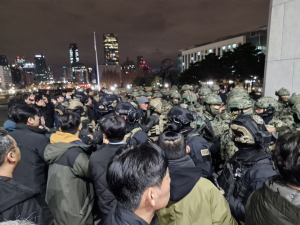On December 6, Han Dong-hoon, the leader of the ruling People Power Party, said he confirmed that President Yoon Suk-yeol had ordered Counterintelligence Commander Yeo In-hyung to arrest political leaders – including Han himself – when the martial law troops were dispatched to the National Assembly on December 4.
This allegation was first brought up by Cho Seung-rae, a spokesperson of the main opposition Democratic Party. Cho told reporters that the three different operation teams of the martial law troops were trying to arrest Woo Won-shik, the speaker of the National Assembly; Lee Jae-myung, the leader of the DP; and Han. Cho said those operations were captured by the CCTV cameras installed in the National Assembly.
According to Hong Jang-won, the first deputy director of the National Intelligence Service, there are other political figures that the martial law troops were trying to arrest, all of them with the opposition. The number of politicians who were on the list of arrests is still unclear.
In his televised announcement declaring martial law, Yoon justified the move by pointing to “anti-state forces” undertaken by the politicians in the opposition parties, particularly in the National Assembly. During a phone call on Tuesday night, Yoon reportedly told Hong to “take this opportunity to take them all in,” according to Hong. Han is the only person on the arrest list that is a member of the PPP, demonstrating the discord between the leader of the ruling party and the president.
In a reversal from his remarks on December 5, Han said in an emergency party meeting on December 6 that it is necessary to suspend Yoon’s presidential authorities for the safety of the country. Although Han did not use the term “impeachment,” his stance has changed from his earlier vow to impede the opposition parties’ moves to kick off the impeachment process of Yoon, which is scheduled for December 7.
In light of Han’s newest remarks, some PPP lawmakers who are in Han’s inner circle may consider voting to impeach Yoon. To suspend Yoon’s presidential powers and authorities immediately, two-thirds of the 300-seat National Assembly need to support impeachment, meaning at least eight PPP lawmakers need to vote for the measure.
Hours after the local media reported Han’s shifted stance on Yoon, Yoon and Han held a meeting at the Presidential Office per Yoon’s request. However, Han told reporters that Yoon made no remarks that could change his call for suspending Yoon’s presidential authority. It is believed that Han is convinced, based on the meetings he had with the president over the past two days, that Yoon doesn’t grasp the severity of the situation he created by declaring martial law. Han may feel he has no choice but to stand apart from Yoon to save the party from collapse – as happened to the PPP’s predecessor in 2016 when it officially opposed impeaching Park Geun-hye. Some breakaway factions of the conservative party at the time did offer support for Park’s impeachment, but the damage was done.
Acting Defense Minister Kim Seon-ho told the National Assembly that Kim Yong-hyun, the former defense minister, was the one who gave directions to the martial law troops. Park Ahn-soo, the army chief of staff, who was the commander of the martial law troops, said he did not recognize that martial law troops were operating in the National Assembly. He also said he found out Yoon had declared martial law after watching his announcement. This signaled that Kim Yong-hyun was the main figure in the Yoon administration who ordered and managed the operations of the martial law troops deployed to the National Assembly. There have been local news reports that the troops also tried to enter the building of the National Election Commission.
Park, the army chief of staff, said he did not have enough time to carefully read the edict he released, which prohibited political activities, including National Assembly sessions. That edict led the police and the deployed troops to block some lawmakers who were trying to enter the building of the National Assembly to participate in a vote to nullify martial law.
In a press briefing on December 6, Kim, the acting defense minister, said he did not agree with declaring martial law in the early stage. He also avowed that the Defense Ministry and the military will not comply with any orders if Yoon declares martial law again in the future. Kim suspended the three military commanders who were responsible for initiating Yoon’s illegitimate martial law from their duties.
However, the opposition party lawmakers and many ordinary South Koreans reflected their deep-seated distrust over the Yoon administration officials and urged everyone to brace for the possibility of Yoon declaring martial law again in the coming days. No one has forgotten that the Presidential Office, the Defense Ministry, and the ruling People Power Party lawmakers called it “fake news” when DP lawmakers warned that Yoon could declare martial law months ago.
Notwithstanding the illegitimate martial law declaration Yoon made on December 4, PPP lawmakers are hesitating to vote for impeaching him. One of the main reasons for their reluctance is the PPP supporters’ framing of those who voted for the impeachment of Park Geun-hye eight years ago as “traitors.” Also, Lee, the DP leader, will likely be the next president of South Korea if the bill is passed and the Constitutional Court upholds impeachment. There are some PPP politicians arguing that they should prevent this scenario from happening.
As of writing, two senior PPP lawmakers, Ahn Cheol-soo and Cho Kyeong-tae, expressed their intention to vote for impeachment. The vote will be held at 5 p.m. KST on December 7, as the DP advanced it two hours earlier than originally scheduled.

































